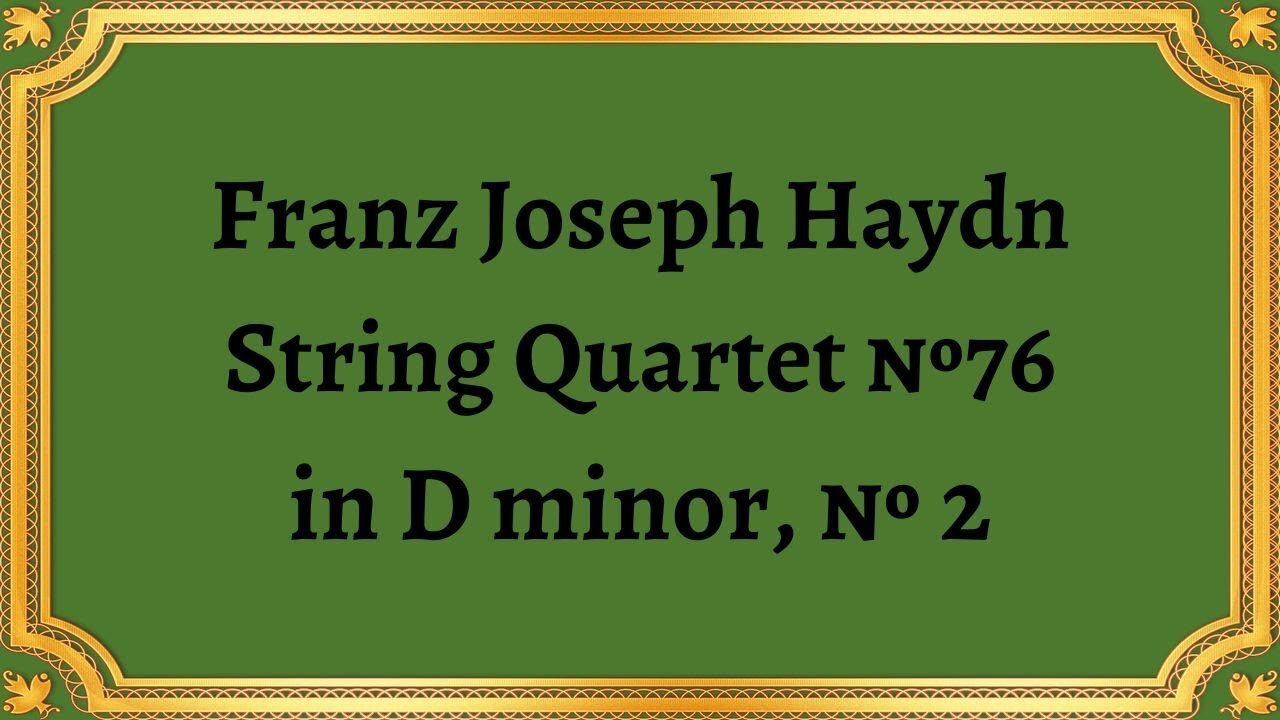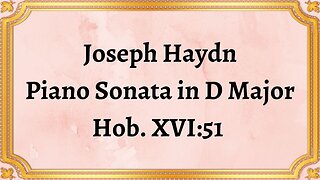Premium Only Content

Franz Joseph Haydn String Quartet №76 in D minor, № 2
#FranzJosephHaydn #StringQuartet #Dminor #Opus76No2 #ChamberMusic #ClassicalPeriod #MusicalComposition #Mozart #HarmonicSurprises #Rhythm #Counterpoint #EmotionalRange #ClassicalMusic #MusicHistory #OrchestralMusic #PerformingArts #MusicEducation #MusicAppreciation #Musicology #musicalgenius
Franz Joseph Haydn, a prolific composer of the classical period, was renowned for his exceptional melodies, innovative harmonies, and skillful manipulation of musical forms. One of his most cherished works is the String Quartet No. 76 in D minor, No. 2, which displays his impeccable compositional abilities.
Haydn's String Quartet No. 76 was composed in 1797 and is thought to have been inspired by the operatic style of Haydn's contemporary, Wolfgang Amadeus Mozart. The quartet is part of a set of six quartets known as Opus 76, which was Haydn's final contribution to the genre, and it showcases his mastery of harmony, texture, and instrumental technique.
The opening movement of the quartet, marked Allegro, immediately captures the listener's attention with its captivating melodies and a sense of yearning. The solemn mood of the piece lingers throughout, punctuated by moments of lightness and harmonic surprises that demonstrate Haydn's exceptional musicality. The second movement, marked Andante o piu tosto Allegretto, is a serene and emotionally rich piece, with a lyrical melody intertwined with the other instruments.
The third movement, marked Menuetto, is a playful and rhythmically rich dance that is both intricate and jovial. The movement exemplifies Haydn's adeptness at crafting unexpected harmonies that continuously surprise the listener, resulting in a delightful musical experience. The final movement, marked Allegro con spirito, is a lively and joyous piece with intricate counterpoint, display contrasting rhythms and contrasting motifs.
The String Quartet No. 76 is a masterpiece of the chamber music genre, with a remarkable depth and emotional range that leaves a lasting impression on the listener. Haydn's use of distinct musical phrases and innovative harmonies contribute to the quartet's elegance, cohesiveness, and coherence.
In conclusion, the String Quartet No. 76 in D minor, No. 2 by Franz Joseph Haydn is a testament to the composer's genius in crafting elegant and emotional musical compositions. It is a piece that demonstrates his profound understanding of harmony, instrumentation, and form. His String Quartet No. 76 continues to captivate audiences and underscores the enduring legacy of Haydn's music.
You have the opportunity to support the channel https://destream.net/live/RadSiarAl/donate
-
 6:07
6:07
Classical music_Music Inspiration
21 days agoJoseph Haydn Piano Sonata in D Major, Hob. XVI:51
701 -
 38:28
38:28
Athlete & Artist Show
2 hours ago $1.46 earnedNHL 4 Nations Face Off High Stakes Betting
20.4K1 -
 LIVE
LIVE
I_Came_With_Fire_Podcast
9 hours agoAncient Egypt's Rise: Lost Tech, Cult of the Blue Lotus, & Secrets of a Fallen Empire
1,648 watching -
 49:24
49:24
Tactical Advisor
2 hours agoNew Holster & Home Defense Shotgun | Vault Room Live Stream 016
28.3K2 -
 LIVE
LIVE
Major League Fishing
3 days agoLIVE! - Bass Pro Tour: Stage 2 - Day 3
664 watching -
 4:44:39
4:44:39
SoundBoardLord
5 hours ago90's Cartoons, Chill Vibes, Good Conversations - SATURDAY MORNINGS WITH CASEY
29.6K2 -
 38:28
38:28
Anthony Pompliano
1 day ago $1.75 earnedPomp on BlackRock & Metaplanet Buying Bitcoin
25.7K1 -
 36:01
36:01
TimcastIRL
15 hours agoThe Green Room #82 - Timcast Discord & Building Culture in the Digital Space with Roma Nation
60.9K11 -
 1:00:59
1:00:59
IsaacButterfield
17 hours ago $1.02 earnedSHOCKING Nurses Rant About Killing Israelis | Kanye Bombshell | USAID Spending
13.9K12 -
 11:38
11:38
MrBigKid
21 hours ago $0.36 earnedSIG 556 Classic SWAT: The Swiss-Inspired Rifle for 'Merica
2.8K1